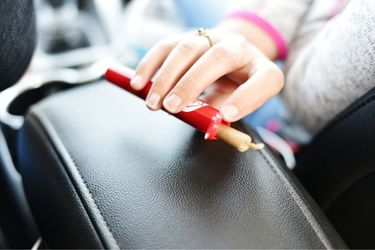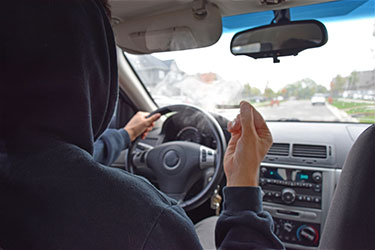
Written by Kayla Jane Barrie Updated on Feb 26, 2025 8 mins read

Driving high is dangerous. Thousands in Ontario and across Canada are injured or killed because of drug drivers. A drug-impaired driving incident happens every three hours in Canada.
Impaired driving is about more than drinking. Many people continue to choose to drive while high on marijuana and other illegal drugs. Even with the introduction of new legislation, drivers still have work to do to improve safety.
In this blog, we’ll discuss driving high in Ontario and Canada. We will define high driving and talk about laws, dangers, statistics about driving while high, and how it can impact car insurance in Ontario.
High driving is a type of impaired driving. It is driving while you are under the influence of legal, prescription or illegal drugs.
According to the Canadian Centre for Substance Abuse (CCSA), among young drivers, driving after marijuana use is now more prevalent than driving after drinking. After alcohol, cannabis is the most detected substance among drivers who die in traffic crashes.
Yes. Driving while high is illegal and has been for decades. Driving while impaired on drugs has been illegal in Canada since 1925. Cannabis is a drug just like alcohol. Its use before or when driving will impair cognitive and motor abilities. It is illegal no matter what vehicle you drive, including trucks, boats, and leisure vehicles.
It is illegal to drive while under the influence of any drug under the Criminal Code of Canada. It is also against the law to drive while on drugs in all provinces. Provincial laws regarding the use of cannabis and driving vary.
In June 2018, Bill C-46 was passed. It added new federal laws and penalties regarding impaired driving. This included penalties for drug driving.
Driving while high on weed or any other drug can impair your ability to drive. Smoking pot and taking drugs can affect you in many ways. Smoking pot results in slower response times, reduced memory and reduced ability to concentrate (and learn). So if you’re high and driving, here’s what might happen:
Cannabis impairs drivers in two main ways. It has two active ingredients that affect people. They are THC (tetrahydrocannabinol) and CBD (cannabidiol). THC causes impairment effects, while CBD offers therapeutic effects.
Your feeling of impairment will depend on various factors, including:
Weed can cause you to feel relaxed and euphoric. You can also experience sleepiness, forgetfulness, and lack of concentration. All of these effects will have a negative impact on your ability to drive.
Drivers caught by police driving while high face a series of impaired charges. If convicted, you face fines, licence suspensions, criminal charges, and even jail time. While there are certain charges applicable across the country, additional penalties vary based on your province, and increases on your car insurance quote .
There are three classifications of charges in Bill C-46. Here are the federal penalties for high driving:
You will receive a maximum fine of up to $1000
With more than 5 ng of THC or any detectable traces of other illegal drugs, such as cocaine, LSD, PCP, methamphetamine you face these charges:
High drivers are also subject to provincial laws. In Ontario, you are subject to the following penalties in addition to the federal fines and penalties:

Drivers 21 and under, or drivers with a G1 or G2 licence cannot have any presence of cannabis or other drugs in their system. If caught driving high, you can face criminal charges, fines, and other penalties.
If you are driving a commercial vehicle, A-F driver’s licence, Commercial Vehicle Operator’s Registration (CVOR), or are driving a road building machine, you also face Ontario’s zero-tolerance law. You can face longer suspensions and additional treatment programs and education requirements.
The Government of Canada provides concerning stats about driving high:
Cannabis can impair your motor skills and cognitive ability. But, how it does this can be different from alcohol. The effects of cannabis are not always as obvious as alcohol. They have a more subtle effect on your concentration, memory, attention, and decision making.
How a person reacts to cannabis can be very different from how they feel the effects of alcohol. While driving high is not the same, it can be just as dangerous. One is not a better option than the other. If you toke or drink, don’t drive.
There are many myths about driving while on cannabis. There is a belief that it doesn’t impair your ability to drive. This is NOT true. Here are some of the common myths about driving high:
Under the new legislation, police can demand a driver do a roadside test prior to an arrested. You must provide an oral fluid sample using Approved Drug Screening Equipment (ADSE). If you test positive you will be arrested and be taken to the police station for additional testing. You may also need to participate in a Standardized Field Sobriety Test (SFST). If you pass these tests, you will be released.
Additional testing will also take place after an arrest for high driving. Police can demand you provide a blood sample. If the test shows you are over the legal limit, you will be charged.
Police can demand you undergo a 12-step DRE evaluation at the police station. After the evaluation, if police determine drug impairment, charges can be laid. Police can also demand a bodily fluid sample to confirm impairment.
If you refuse to comply, you can save a minimum $2,000 fine and a maximum of ten years imprisonment.
There are a number of common signs of weed impairment. They are the smell, red eyes, shallow breathing, dry mouth, and rapid heart rate.
The fine for driving high in Canada varies based on the amount of cannabis in your system and if you are a repeat offender. For the first offence with 2-5 ng of THC you face a maximum fine of $1000. If you have 5+ ng of THC in your system you have a minimum of a $1000 fine and possible jail time.
It is not recommended – even if you have a legal prescription for cannabis, it can affect your ability to drive. However, the Ontario government will allow some leeway for driving with THC in your system. If an officer approves that you are legally authorized to use it medicinally, you won’t be subject to the zero-tolerance requirements.
If you don’t meet the requirements or are driving poorly, you can still face penalties and criminal charges.
You are subject to the same laws if you consume edibles. Edibles can be tricky because you often don’t feel the effects right away as you do when smoking cannabis. You may be tempted to drive. Edibles are slow release and the effects will arrive up to two hours later. If you take edibles, choose not to drive.
CBD oil is different than other cannabis products containing THC. CBD does not get you high, it relaxes you. It is used to treat many different medical conditions. Generally, it is safe to drive after using CBD oil. Roadside tests do not test for CBD. They test for the presence of THC. It's unlikely CBD would result in a positive roadside drug test.
CBD is generally considered safe to use and drive. But, some CBD products do contain trace amounts of THC. How CBD oil impacts you also need to be considered before you drive. Use your judgement.
Yes. There is a roadside test police can perform to test for high driving. There are additional tests they can also do at the police station.
Yes. You face the same consequences for driving high as drunk driving. In addition to fines, you could face jail time. You will also have issues getting insurance. You may be required to get high risk car insurance.
Yes. You will receive a criminal conviction if you are charged with driving while on drugs. You will have a criminal record.
All types of drugs could affect your ability to drive. How a drug affects you is unique. It’s different from person to person. Alcohol, cannabis, opiates, and other types of depressant and stimulant drugs can impair your ability to drive.
Under the new legislation introduced in 2018, police can use drug screening devices to test for the presence of THC, cocaine, and methamphetamines. If you fail a roadside test, additional testing will be conducted at the police station.
Driving while high is not a good idea. If you are not sure if you should drive or not, just don’t get behind the wheel.
Driving while high is not a good idea and can have serious repercussions. Impairment from cannabis can last up to six hours or more, depending on THC levels and how it was consumed. If you are not sure if you should drive, don’t get behind the wheel.
| Categories | Auto |
|---|---|
| Tags | Auto Coverage |
Read our insurance blog to get helpful tips, information and news.
Find out if a seatbelt ticket will raise your car insurance rates and how insurers view seatbelt violations.
Ontario’s Project CHICKADEE dismantled a $25 million auto theft ring. Discover how this massive bust targets export enablers and what it means for rising Canadian insurance premiums.
Think refusing a breath test helps your case? In Ontario, it results in a minimum fine of $2,000 and a criminal record. Compare the penalties and protect your future.
Impaired driving in Ontario is a serious offence. Learn about impaired driving fines, penalties, statistics and other important information all drivers in Ontario need to be aware of before they get behind the wheel.